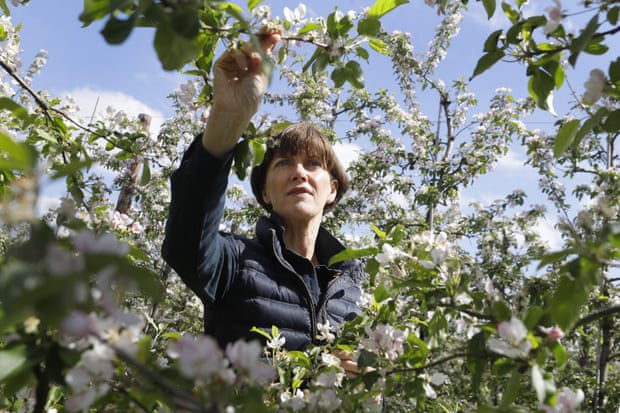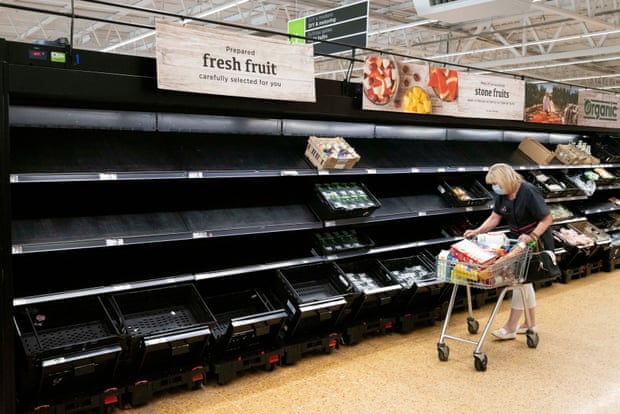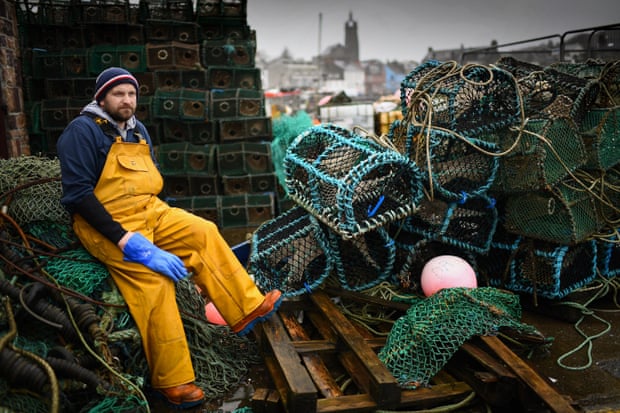When British politicians talk about Brexit and its consequences, they tend to adopt rictus grins and assure us that, by some miracle as yet unexplained, everything is going to be OK. The Labour leader Keir Starmer, who only a few years ago was a passionate advocate of a second referendum on our exit from the EU, now has a five-point plan to “make Brexit work”. Meanwhile, as the Tory leadership contest grinds on, both the candidates are at pains to claim that life outside the EU is going wonderfully well, or soon will do.
No matter that leaving the EU has tangled up businesses in form-filling, fees and a new world of unbelievable complexity: Rishi Sunak says he wants to “go further and faster in using the freedoms Brexit has given us to cut the mass of EU regulations and bureaucracy holding back our growth”. Liz Truss sounds even more zealous: she now wants to scrap all the regulations in UK law that are there as the legacy of our time in the EU by the end of next year, to “make the most of our newfound freedoms outside the EU”.
Six years ago, Truss – unlike Sunak – enthusiastically campaigned for remain, but she is now more than happy to eat her words. “I was wrong and I am prepared to admit I was wrong,” she recently told the BBC. “Some of the portents of doom didn’t happen and instead we have actually unleashed new opportunities.”
That “some” is a very telling use of language. The peace process in Northern Ireland and the power-sharing arrangement it created – perhaps the greatest achievement of post-Thatcher British politics – have been severely destabilised. The UK is an increasingly lonely, sometimes downright odd presence on the world stage. Most of Europe, indeed, seems to think we have gone collectively mad.
And then there is the impact on our everyday lives. In the face of Westminster’s mixture of silence and forced optimism, Brexit is having a measurably dire effect on just about all of us. A recent survey done by the opinion pollsters Ipsos showed that the proportion of Britons who think the UK’s exit from the EU has made their daily life worse has gone up from 30% in June 2021 to 45% now, a figure that includes just under a quarter of people who voted leave. Amid the aftershocks of our national lockdowns, these mounting problems are becoming ever more obvious. And so, by way of filling the informational gap left by our politicians – and, indeed, most of the media – this strange, baking-hot summer seems like a good time to set out just some of Brexit’s apparently endless downsides. Starting with …

Labour shortages
Britain in 2022 is a country of long waits, spiralling queues and that omnipresent feeling that not nearly enough people are being employed to keep everything running. Our shortage of workers extends from pubs to hospitals: one of the most worrying examples is what is happening to adult social care, which is already reeling from the pandemic.
To state the blindingly obvious, despite its self-evident importance, care is a low-paid, low-status line of work, which tends to have high rates of staff turnover. As the number of older people increases, so does the prevalence of often chronic health conditions, which means we need more and more care workers. But Brexit has pulled an already struggling part of our social fabric into even greater crisis.
“It’s been devastating,” says Nadra Ahmed, the chair of the National Care Association, which represents small and medium-sized care providers. “It’s made an already declining situation, much, much worse. We’ve lost a lot of our European colleagues. They decided they no longer wanted to stay. They felt unwanted, unsafe, undervalued.”
Two years ago, she tells me, 5.2% of those starting new jobs in adult social care were foreign nationals; now, that figure is less than 2%. Under pressure from care employers, the government recently relaxed stringent restrictions on visas for care workers, but staffing problems continue to mount.
To make things even worse, Brexit-related labour shortages in other fields of work are pulling people away from care in increasing numbers, with obvious consequences. In May 2021, the vacancy rate in adult social care was 5.9%. In April this year, it reached 10%.
For people who need residential care, the effects can be grim. “A lot of providers have stopped taking people from hospitals who are high-need, because they don’t have the staff to cope,” says Ahmed. “Or they’ve closed a percentage of the beds in their services. If you’ve got a 30-bed service, you might bring it down to 25 beds, so you’ve got the right ratio of staff.”
And what does that mean for people who need care?
“Well, they’re often stuck in hospital, which is why you hear about all issues in the NHS with that awful term ‘bedblocking’. That’s people sitting in NHS hospitals who are medically fit for discharge, but they can’t be placed anywhere because no service can deliver the care.”

What Brexit means for British food-growers
Britain is seemingly short of food, hunger is an increasingly visible problem, and empty shelves in supermarkets are now an ingrained part of everyday life – but we are also throwing away tonnes of produce.
Ali Capper is the owner of a farm in Worcestershire that grows apples and hops. When harvests peak between late August and mid-October, she needs about 70 temporary employees. “We’re pretty small-to-medium in that respect,” she says. “There are soft fruit growers who’ll employ 1,000 to 1,500 for the summer, and vegetable growers who need more like 2,500 to 3,000.”
Since 2017, getting enough workers has been an annual headache. “If you haven’t got labour, you can’t harvest your crop, and you don’t have a business,” she says. “It’s as simple as that. And we’ve had two years when we’ve had to walk past crops: that’s how we describe it. You have to start prioritising. You leave the less good, or the marginal, or the second-pick: the crop that might not get you the highest return.”
What proportion of her produce has been thrown away? “I’m not going to crystal-ball this season,” she says. “But in previous seasons, we’ve probably left behind up to 25%. That’s really painful.” Where does it leave the business? “Well, I would say that in fresh produce, many businesses are questioning their sustainability.”
Since the referendum, the makeup of her workforce has drastically changed. It used to be split between people from Poland, Romania and Bulgaria, many of whom would come back three or four seasons running, and become expert pickers. Now, workers come from such countries as Uzbekistan, Kazakhstan, Mongolia, Ukraine and Russia – and convulsive recent events in the latter two countries have meant more people only coming for a single period, which has led to a drop in productivity.
There is also, Capper says, a rising issue with some of the export companies she deals with, as evidenced by a Worcestershire-based hops merchant she knows who is about to set up a new warehouse in Poland. “Hops is an international business,” she says. “If he brings hops in from Australia or America, and he wants to package them up with hops from the UK and send everything into Europe, he’s paying double duty. The only way of avoiding that is directly importing hops into Europe. So we’re going to see merchants with a focus on Europe rather than here. And that means UK hops will get forgotten.”

Brexit is also terrible for food imports
Before Brexit happened, Truss famously alerted the Conservative party conference to the fact that the UK imported two-thirds of its cheese – which was, she half yelled, “a disgrace”. She is, therefore, presumably ecstatic about the seemingly endless snags that now face British buyers of European dairy products – and, for that matter, lots of other EU foodstuffs besides. Food importers face many of the same bureaucratic nightmares as exporters (in the words of Speciality Food magazine, “with Brexit now officially in full force, cheesemongers across the UK are struggling with costs and supplier issues when it comes to importing European cheeses”), which is one of the reasons why the refrigerated aisles of many British supermarkets are often so sparsely stocked. Note also: the British government was due to introduce new import controls on EU food products this summer, but their arrival has been postponed for a fourth time. If they ever materialise, importing European products will be even more problematic.
What’s happened to other businesses
At the end of June, the EU published figures showing that between 2020 and 2021, British exports to the rest of Europe had fallen by 14%. Covid was part of what had happened – but, as one high-ranking European commissioner said, the plunge was also down to “paperwork for virtually every product shipping between our markets”, and checks on “thousands of goods being carried out on a daily basis” – as well as a sudden mess of VAT, import duties and raised charges for transporting goods from Britain to the continent.
Since 1995, Kenneth Mackenzie has run a high-end men’s casualwear business called 6876, based in London. Pre-Brexit, he could count on a resident of Berlin or Paris buying his clothes on exactly the same basis as someone in the UK. But, since Britain left the EU, he has lost somewhere between 60% and 70% of his European customers, which accounts for about 30% of his business. “They just don’t want the hassle,” he says. “They don’t want to pay the duty and the VAT.”

Worse still, he now has to hack his way through a tangle of complexity that surrounds the clothing factories he uses on the continent, who charge far less than manufacturers in Britain, and thereby make his business viable. He uses a company in Portugal to manufacture his jackets, to exacting specifications. But now, thanks to customs checks and byzantine courier arrangements, he is never sure how long it will take for finished products to arrive back in the UK. “You can pay for a two-day service, getting things back, and it’ll take nine days now,” he says. “It’s insane; it’s actually got slower. Before Brexit, you could get stuff in two days, or even overnight, if you paid for it. Now, it just comes when it comes. Boxes get split: I’ll be checking on the internet thinking, ‘Why’s this box in France? Why’s that one in the UK?’”
Queues that even British people can’t cope with
It was easily the most vivid illustration so far of how Brexit has upturned things that millions of Britons once took for granted: the episode that exploded into the news on Friday 22 July, when the Port of Dover declared a “critical incident”, as droves of people trying to get to the continent were stranded in six-hour queues.
Even Jacob Rees-Mogg was forced to admit this week that he was wrong to say Brexit would not cause delays at Dover. The port’s chief executive – along with an array of Conservative politicians – blamed insufficient staffing at French border posts, but there was an obvious related issue: the plain fact that British travellers now have to go through the bureaucratic ritual of getting their passports stamped, instead of going through the pre-Brexit quickfire checks (the typical processing time has reportedly gone from 58 to 90 seconds – which, when you’re dealing with thousands of people, is obviously a big jump). Much the same applies to the multitudes of British people who are now arriving in Spain – where, at airports in Mallorca, Ibiza and Alicante, there have been reports of long queues for the “third country” entry points that they must now use. Worse still, Spanish border staff may now ask for proof of a return plane ticket, where British arrivals are staying, and guarantees that they will spend at least £85 a day. The Austrian daily newspaper Kleine Zeitung recently summarised all these stories, saying, with no schadenfreude whatsoever: “The British discipline of queueing is occasionally put to the test at EU airports. It is a consequence of Brexit that leaves a nasty taste in some of the kingdom’s tourists.”
Anaemic economic growth
Just about every major economy in the world is facing big problems, and the countries of mainland Europe are no exception. But whereas the EU’s gross domestic product (GDP) per head has grown by 8.5% since Brexit, the UK’s figure is just 3.8%. Moreover, the UK is now behind all the other G7 nations in its recovery from the pandemic. If a country shrinks its export markets, strangles its supply routes and creates labour shortages, this is what happens – a view backed up by the government’s own forecaster, the Office for Budget Responsibility (OBR). Its basic prediction remains in line with what it projected in March 2020: that Brexit would reduce UK productivity and GDP by 4% compared with remaining in the EU. The OBR says that a little over half of that damage has yet to hit us.
There is a piquant twist to the part of the post-Brexit tale. In June this year, the Office for National Statistics revealed that in the July-September quarter of 2021, England and Scotland’s GDP had grown by 0.6% and 0.9% respectively, and Wales’s had slightly shrunk. Thanks to the controversial Northern Ireland protocol, by contrast, that part of the UK was still benefiting from trading in the EU single market, and its GDP had gone up by 1.4%.
Inflation
The UK has the highest inflation rate of any country in the G7: higher than France, Italy and Germany. To state the obvious, the war in Ukraine and pandemic-related supply issues are sending prices soaring across the world, but what gives Britain a particularly pronounced problem – which forecasters say will endure into the immediate future, while inflation in the eurozone starts to fall – is Brexit. Our departure from the EU has weakened the pound, which increases the prices of imports, and adds to companies’ costs. Post-Brexit limitations on foreign workers are also hitting firm’s bottom lines, as are problems with the UK’s European supply chains. In April, Adam Posen, an American economist and former member of the Bank of England’s monetary policy committee, said that 80% of the explanation for Britain’s higher inflation was bound up with Brexit and its endless complexity. It amounted, he said, to “a trade war the UK declared on itself”.

Universities
The government has tried to patch up at least some of the damage Brexit has inevitably caused to British universities and research. There is one obvious example: in place of the UK’s participation in the EU’s Erasmus+ programme – which, pre-Brexit, allowed thousands of UK students to study or train in Europe, and people from EU countries to do the same here – there is now the Turing scheme, which will provide funding for about 40,000 British students a year to study and work abroad.
But Brexit has drastically changed the UK’s universities, what they do, and the people who work and study in them. Between 2020 and 2021, there was a 40% drop in the number of students from EU countries coming to the UK. Academics say that their European colleagues are increasingly reluctant to work here – partly because teaching and research often depends on people being mobile enough to move from one institution to another, often with their families, and Brexit has put no end of barriers in the way.
One recent story crystallises what is happening. As Britain left the EU, UK negotiators managed to secure associate membership of Horizon Europe, the EU’s €95.5bn (£80bn), seven-year “framework programme for research and innovation”. But in July, it was announced that because of the government’s failure to resolve issues around Brexit and Northern Ireland, 115 of its grants for UK-based research projects were being cancelled. British involvement in Horizon Europe is now seriously in doubt: the UK government says it has a backup funding plan for researchers, but there is widespread suspicion that it will be an inferior, inward-looking version of a programme that brought British universities no end of benefits.
Thiemo Fetzer is a 36-year-old, German-born professor of economics at the University of Warwick. The Horizon announcement threatened the cancellation of a €1.5m research project he had been preparing for a year, which will look – among other things – at how the media across the world covers the climate crisis, and its political implications. He has now transferred the project to the University of Bonn in Germany, where he will soon spend 50% of his time. “It’s been extremely unsettling, very difficult to deal with emotionally,” he says. “I consider the UK my home, but it’s a home that keeps on rejecting me. I hope to start a family in the next couple of years, and I don’t know whether the UK’s a good place to do that.”

Fishing
Some people who make their living from fishing were among Brexit’s loudest supporters, encouraged to look forward to a new ocean-going utopia of unrivalled access to British waters, and the binning of European rules and regulations. When Boris Johnson’s deal with the EU was announced, these hopes palpably faded, though there were some who tried to hang on to a little optimism: in the view of the trade journal Fishing News, the agreement at least secured “tariff- and quota-free exports to the EU, although with a massively increased burden of paperwork”.
The latter involves a whole new world of pain. Jamie McMillan – who didn’t vote in the 2016 referendum at all, something he says he regrets – runs Lochfyne Langoustines, a small seafood business on the shores of the sea loch in west Scotland from which it takes its name. The company sells “live langoustines, live king scallops, live lobster, live razor clams – premium products that can achieve very high prices”.
When we speak, it does not take long for him to get down to the basics of his position. “We no longer export to Europe,” he says. “We’ve lost 60% of our turnover. We tried to do it, but four months after Brexit, we realised it was no longer viable. We’re a small company, and after Brexit, it cost us £500 per day per dispatch. It’s barely worth it.” His increased costs, he explains, are down to customs declarations, new charges, health certificates that now have to be completed for every variety of shellfish, and more. “In the first four months of 2020, we had to spend £17,500 just on paperwork. We can’t afford that.”
Before Brexit, Lochfyne Langoustines employed 23 people. That number is now 13. The company is now trying to attract business in Singapore, Hong Kong, the US and elsewhere – something McMillan says shows promising signs, but will take years to really bed in. Trading with such countries, moreover, entails spurning markets on his doorstep in favour of flying shellfish halfway around the world. “It’s absolute madness. But it’s easier and quicker for me to sell products to China than it is to France.”

The arts – and music in particular
For musicians, actors and the multitudes of people whose work puts them on stage, Brexit amounts to a particularly mind-boggling tangle of rules, demands and fees that simply didn’t exist when practitioners of the arts could work and travel freely around mainland Europe. Obviously, this cuts both ways: fewer European performers fancy coming here, and talented people in the UK have to find ways of surmounting endless obstacles, if they can. The results of the latter problem are obvious: figures recently published by the campaign group Best for Britain show that the number of British musicians playing at EU festivals this summer has fallen by 45% compared with the period immediately before Brexit and the pandemic.
Sarah McQuaid is a folk musician based in Cornwall. She tours on the most stripped-down basis imaginable: in a single car, with her manager-cum-roadie. She tends to play very intimate venues – in Berlin, she tells me, her favourite place has a capacity of 60 – but between tickets and on-the-road sales of vinyl LPs, CDs, T-shirts and other “merch”, that model has always allowed her to just about make a living.
Brexit has upturned everything. “Continental Europe was the one place I could get good audiences, and really good merch sales,” she says. “Even with the cost of ferries getting over there, I could still earn more in four weeks than I’d make in twice that amount of time in the UK. You could earn as little as €400 on a fee, but make the same amount on merch sales. So, for a solo artist like me, it worked.”
She says she knows musicians who have now simply decided to stop playing in Europe. One problem is the different VAT regimes in each European country: “I’m supposed to register for VAT in every single one of them, declare the value of all the merch I’m bringing in to sell, and pay VAT on it. And then when I leave the country, I can reclaim the VAT, as long as I can show that I’m bringing all the stuff out again.” Another issue is import duty. And then there are Carnets: the documents that now have to detail the equipment being moved from country to country, and that entail sizeable fees (McQuaid’s latest one cost £379.25 – for the kind of operation surrounding a band or theatre company, the costs are inevitably even more punishing).
When she recently toured Ireland, what struck her the most was the spectacle of customs officials having to check her load as she arrived by ferry: “They’re not there to make sure that musicians who take a PA system out of the country take it back in again. They’re there to catch people-smuggling.”
She sighs, and then echoes something I have heard from just about everyone I have spoken to: a sense of rules, arrangements that make no sense, and are upturning people’s lives. “It’s such a waste of everyone’s time,” she says. “Why do it?”
Stay connected with us on social media platform for instant update click here to join our Twitter, & Facebook
We are now on Telegram. Click here to join our channel (@TechiUpdate) and stay updated with the latest Technology headlines.
For all the latest Education News Click Here
